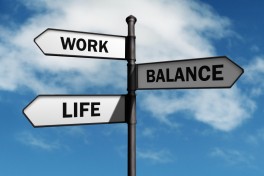Trend alert: Work/Life Balance is Dead. Or maybe it’s going to be dead. Or maybe there’s no such thing. So, for all of you who were trying to achieve it, feel free to give up. See, wasn’t that easy? Apparently work is now so completely integrated into life, that life is now work.
Except that’s complete baloney. Work is work, and life is life. And don’t let some consultant or latter-day metaphysic tell you otherwise. Work is the yin to life’s yang. The cream in the coffee. The jelly in the doughnut. (Can you tell I wrote this before breakfast?)
The basic premise behind the obituary for work/life balance is that the new, basic ubiquity of work, thanks largely to our smartphones, constant wi-fi and other aspects of the digital revolution, now requires us to make choices or negotiate exchanges with work to actually have time to live. Well, duh. Many of us already thought that’s what the pursuit of work/life balance required.
Additionally, the very concept of work/life balance has been questioned and targeted as something akin to a passing fancy. Some have pointed out that humans only relatively recently even thought about having a work/life balance, with the rise of shift work in the 19th Century. Before then, it was early to bed, early to rise, work, work, work. Who had the time to think about what else they could be doing except working, right?
Not so much. People have been enjoying time away from work as long as work has existed. Which is to say, as long as people have been walking around this earth. Take literature or the performing arts. It’s safe to argue that they wouldn’t have persevered for millennia without any audience that wasn’t too busy working to read or listen to music or watch a play. How about the basic concept behind the sabbath? Heck, even God rested on the seventh day. Isn’t that ultimate proof of the endurance, perhaps eternally, of the need for work/life balance? (And you can bet God wasn’t checking his email that day, either.)
Work/Life balance isn’t dead, nor is it dying. As times and technology change, so does our relationship with work, and with our lives outside work. For some, the discussion has evolved to whether another currently popular bromide — “Do what you love. Love what you do.” — is a concept that answers the work/life balance challenge, and essentially solves it, or instead is a elite pursuit that exacerbates social and class divisions in society. …
For most of us, balancing work with the rest of our lives is a constant struggle played out on our iPhones or in the grocery store parking lot. Some days, work wins. If it wins too many days, burnout and other negative repercussions ensue. Other days, life wins, and hopefully in a good way in the form of vacation, a special occasion or your addiction to Candy Crush. (2048 in my case.)
The point here is that we need to struggle for balance between our work and our lives. Sometimes the stress it causes might even be good for you. In so many ways, our pursuit defines both who we are and what we want to be in the future. Now, maybe even more than ever, we still need work/life balance.




Lizayne
There are lots of ways to solve the problem of sesanoal resourcing demand. It really depend on how the business leaders are trying to improve their business. One cannot say that because there is sesanoal demand so maximum work hours will not work. The firm I’m working in utilises the fact that the peak demand around the world being different at different countries and offer swap arrangements to solve this problem. There are ways! As long as the business leaders kept being innovative about their business there is a way out.